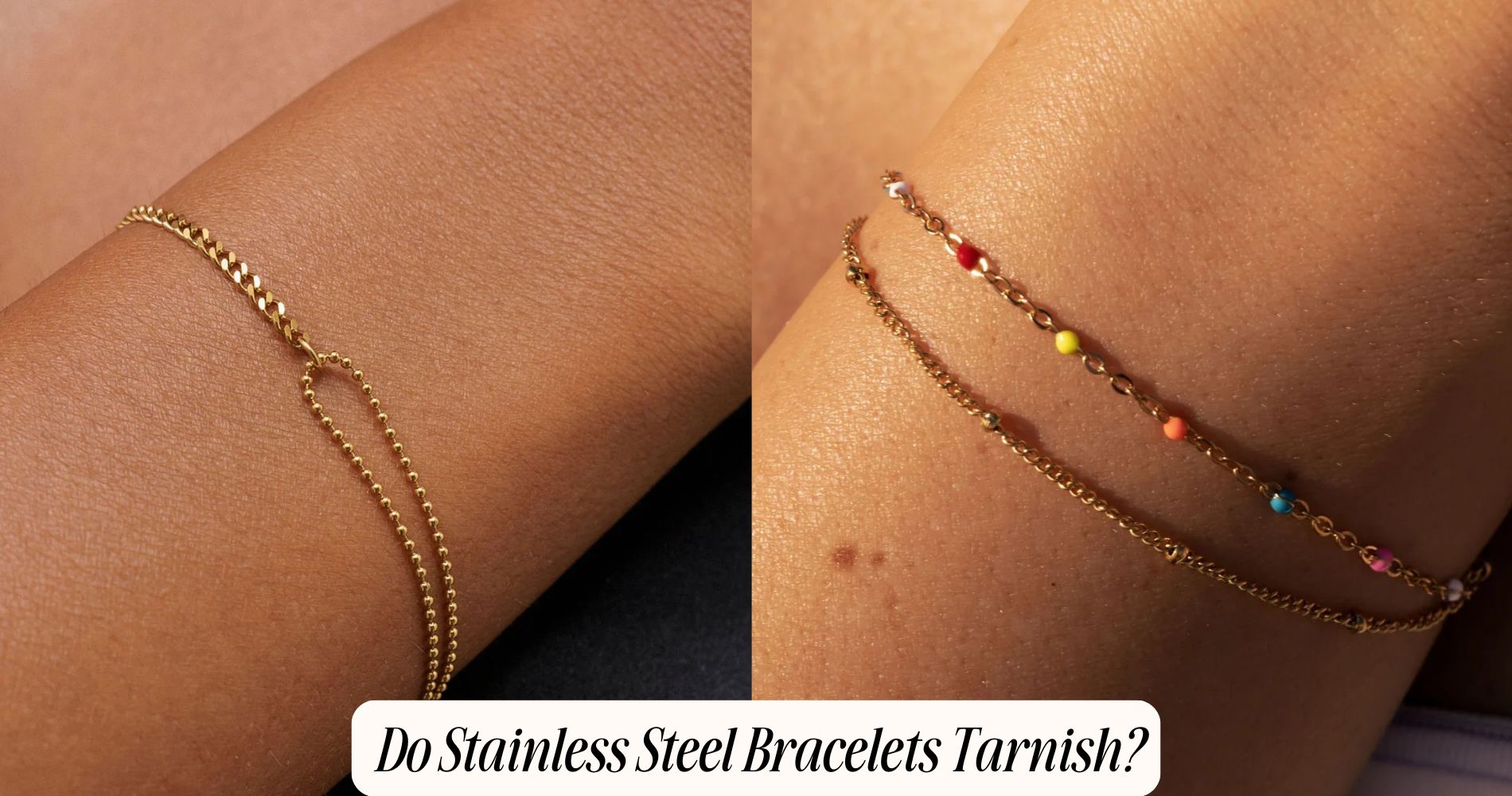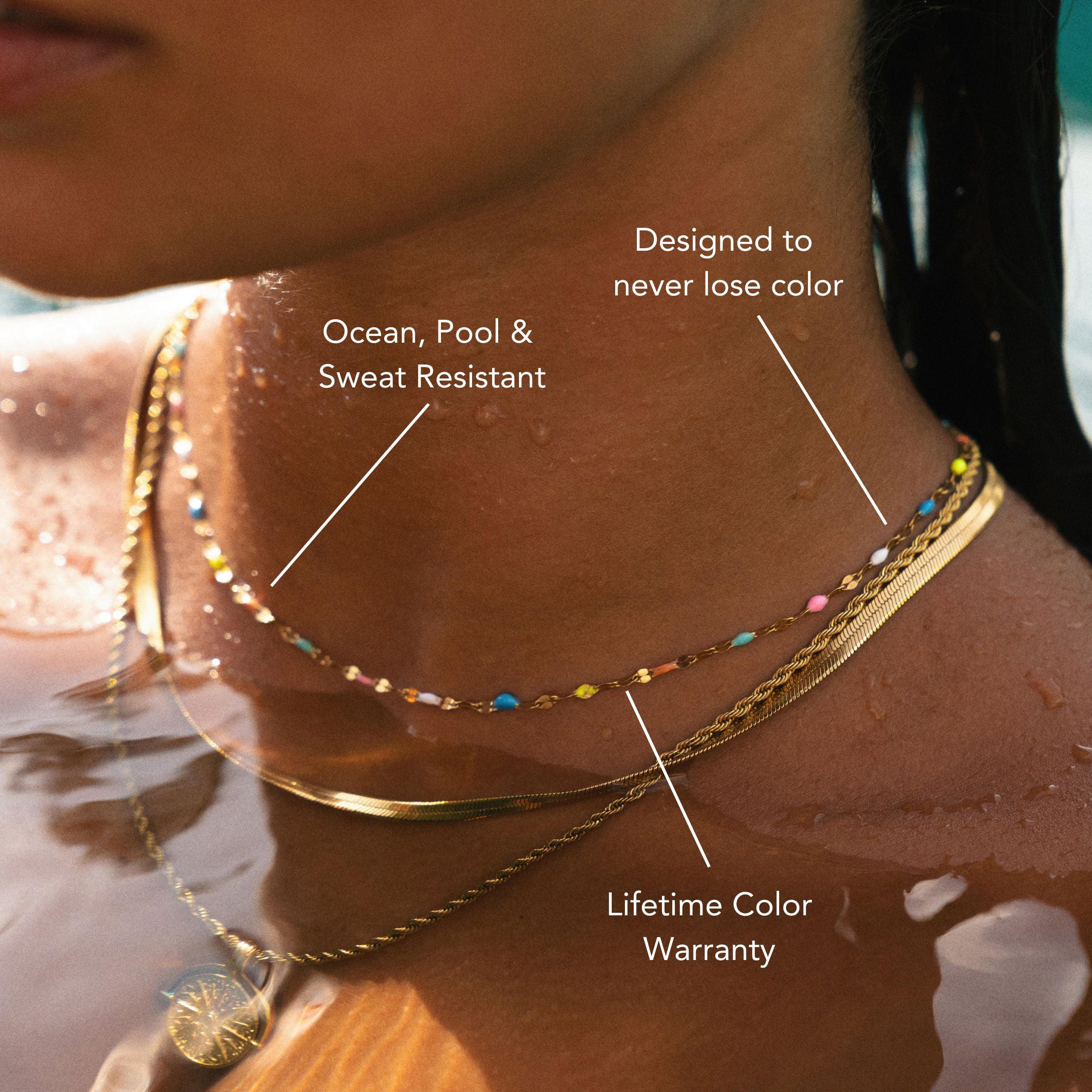
Do Stainless Steel Bracelets Tarnish?
Many people wonder, do stainless steel bracelets tarnish? The answer is generally no, because stainless steel is primarily composed of iron, chromium, and nickel. The chromium forms a protective oxide layer that prevents oxidation and helps maintain the bracelet’s shine. While stainless steel is highly resistant to tarnish, different grades can offer varying properties. With simple care—like cleaning with mild soap—you can keep your bracelet looking its best. Clearing up misconceptions about stainless steel jewelry will help you better appreciate its durability and beauty. And if you’re drawn to a more delicate look, don’t miss our Thin Gold Bracelets collection.
Understanding the Composition of Stainless Steel
Stainless steel, a marvel of modern metallurgy, consists primarily of iron, chromium, and other elements such as nickel and molybdenum.
These components form stainless steel alloys that provide significant metal durability, making them ideal for various applications, including jewelry.
By incorporating chromium, the alloys gain impressive corrosion resistance and strength.
Nickel enhances this further, adding to the material's toughness and flexibility.
Molybdenum, though less prevalent, increases resistance to pitting and enhances overall stability.
When you wear a stainless steel bracelet, you're benefiting from these carefully balanced elements.
Each component plays an essential role in ensuring your bracelet remains robust and long-lasting.
Understanding these alloys helps you appreciate the engineering behind such durable metal creations.
The Science Behind Tarnish Resistance
Although many metals are prone to tarnishing, stainless steel stands out due to its exceptional resistance to this common issue. This resistance is primarily due to its chromium content, typically around 10.5% or higher.
When exposed to oxygen, a passive layer of chromium oxide forms on the surface. This layer is vital because it prevents the oxidation process from advancing, effectively halting tarnish formation.
Unlike other metals that rapidly deteriorate, stainless steel maintains its integrity by continually forming this protective barrier. As long as the chromium oxide layer remains intact, your stainless steel bracelet won’t tarnish.
It’s a self-healing mechanism, ensuring longevity and keeping your bracelet looking pristine. This scientific phenomenon explains why stainless steel is a preferred material for jewelry.
Common Misconceptions About Stainless Steel
Beyond the scientific marvel of tarnish resistance, misunderstandings about stainless steel still persist.
One common myth is that stainless steel is completely impervious to all forms of corrosion. While it's highly resistant, exposure to harsh chemicals or saline environments over extended periods can cause damage.
Another misconception is that all stainless steel is created equally. In reality, different grades exist, each with unique properties. For instance, 316 stainless steel offers greater corrosion resistance than 304.
Additionally, people often believe stainless steel jewelry is hypoallergenic; however, some individuals may still react to nickel, which is present in many alloys.
Tips for Maintaining Your Stainless Steel Bracelet
To guarantee your stainless steel bracelet remains in pristine condition, regular maintenance is key.
Implement effective cleaning techniques by using a soft cloth and mild detergent to wipe away dirt and oil. Rinse thoroughly with lukewarm water, ensuring no residue remains. Avoid abrasive materials that can scratch the surface. For stubborn stains, a paste of baking soda and water can gently lift impurities without damage.
For ideal storage solutions, keep your bracelet in a soft-lined jewelry box or pouch to prevent scratches and exposure to moisture.
Avoid storing it alongside other metals that may cause friction or tarnishing. By adhering to these methods, you’ll extend the lifespan and maintain the luster of your stainless steel bracelet.
Comparing Stainless Steel to Other Jewelry Metals
When comparing stainless steel to other jewelry metals, it's essential to take into account durability, cost, and maintenance.
Stainless steel advantages become apparent when you examine these factors closely. Unlike gold or silver, stainless steel is highly resistant to tarnish and corrosion. This makes it a superior choice for everyday wear, especially in harsh environments.
In jewelry metal comparisons, stainless steel stands out for its strength and scratch resistance, ensuring longevity. In addition, stainless steel is considerably more affordable than precious metals, allowing you to enjoy stylish designs without the hefty price tag.
Maintenance is minimal—just occasional cleaning with mild soap and water, unlike silver that requires regular polishing. Consequently, stainless steel offers excellent value for your investment.
Frequently Asked Questions
Can Stainless Steel Bracelets Cause Allergic Reactions?
Yes, stainless steel bracelets can cause allergic reactions. Nickel, present in some alloys, may trigger stainless steel allergies, resulting in skin irritation. If you're sensitive, opt for hypoallergenic options to minimize the risk of adverse reactions.
Are Stainless Steel Bracelets Suitable for Daily Wear?
Yes, stainless steel bracelets are suitable for daily wear. They offer excellent durability compared to other metals and boast style versatility. You'll find them resistant to scratches, maintaining their appearance, and matching various fashion preferences seamlessly.
Do Stainless Steel Bracelets Affect Magnetic Fields?
Stainless steel bracelets generally don't affect magnetic fields due to their non-magnetic nature. Their properties minimize magnetic interference, making them safe nearby sensitive devices. However, always verify specific alloy compositions for any potential interactions in specialized environments.
Can I Shower With a Stainless Steel Bracelet?
Yes, you can shower with a stainless steel bracelet. Its resistance to water exposure makes it durable. However, for ideal bracelet care, regularly dry and clean it to maintain its shine and prevent potential water spots.
Are Stainless Steel Bracelets Eco-Friendly?
Yes, stainless steel bracelets are eco-friendly. By embracing sustainability practices, manufacturers reduce environmental impact. You can recycle stainless steel, making it a durable choice that supports efficient material reuse, minimizing waste and conserving natural resources effectively.
Conclusion
You've learned that stainless steel bracelets are engineered to resist tarnishing, thanks to their chromium-rich composition. This protective layer prevents oxidation, distinguishing stainless steel from other metals like silver or gold. However, maintaining your bracelet's luster requires regular cleaning and avoiding harsh chemicals. Knowing these details, you're empowered to choose stainless steel confidently, appreciating its durability and minimal upkeep. Your bracelet can remain a polished accessory for years, showcasing your informed decision in jewelry selection.























コメントを書く
このサイトはhCaptchaによって保護されており、hCaptchaプライバシーポリシーおよび利用規約が適用されます。